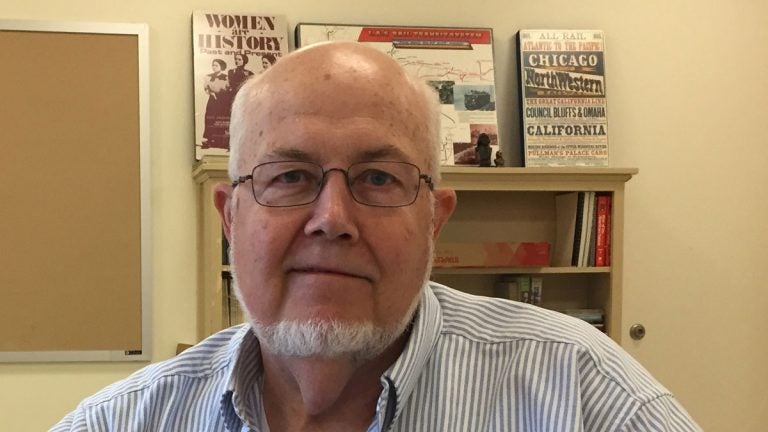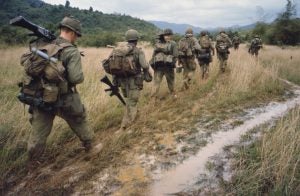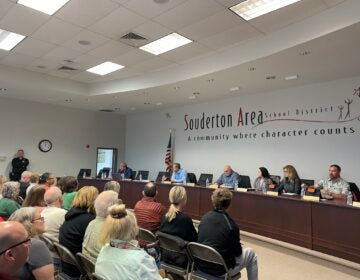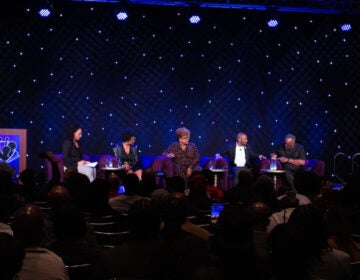‘It’s complicated’: U.S. history teachers still grapple with Vietnam War

U.S. history teacher Tom English inside his classroom at George School in Bucks County. (Avi Wolfman-Arent/WHYY)
Later this month, WHYY-TV will air Ken Burns and Lynn Novicks’ 10-part documentary on the Vietnam War. American forces withdrew from Vietnam in 1975. This story is part of WHYY’s series examining how, more than four decades later, the country is still processing this defining and divisive conflict.
“The Vietnam War” series premieres Sept. 17 at 8 p.m. on WHYY-TV.
Tom English taught his first course about the Vietnam War in 1986, 11 years after Saigon fell to the North Vietnamese.
He was living in Virginia at the time, teaching at the all-girls Foxcroft School. As part of the lesson plan, he took his students at the buttoned-down boarding school to a showing of “Platoon,” director Oliver Stone’s feverish portrayal of an Army unit at war with the Vietcong and itself.
“In those days, it was very recent,” English recalled. “And the turmoil — the public turmoil — about the war was so very recent.”
The father of one of the girls in his class had served as a surgeon in Vietnam, English remembered. More than a decade after his service, the father refused to divulge any details of his time in combat. That is, until his daughter took English’s class.
After his students saw “Platoon” and studied the conflict, the student’s father opened up. On a ride back to Foxcroft after a weekend at home, father and daughter spent three hours discussing his experience in Vietnam, “which he would only do because she had taken a class and seemed to have some understanding of the subject,” English said. “Which made me very, very happy.”
For English, teaching about Vietnam in those early days was a form of therapy. Classrooms provided the safety and perspective students needed to process a conflict that could be difficult to discuss in other settings.
This fall, English begins his 41st and final year as a teacher. He still teaches Vietnam, albeit at the liberal-leaning George School in Newtown, Bucks County.
Today’s students, he said, have less interest in the war than they do in the anti-war movement. Four decades after Vietnam ended, English’s charges tend to identify with the counterculture spawned by war resistance.
English likes to play them the 1966 hit song “Ballad of the Green Berets” to remind them lots of people — including young people — supported the war.
“What I try to get across now is the deep division of the country,” English said.
As the Vietnam War recedes further into memory, U.S. history teachers find themselves spending more time explaining the conflict: Why did it happen? How did Americans process it? What are its enduring lessons?
Delving into identity, attitudes
When Stephen Kozol first taught advanced placement U.S. history in the early 1990s, his students naturally understood the Cold War context that begot America’s involvement in Vietnam. Today, he has to give a lot more background for his student at Upper Merion Area High School in King of Prussia, Montgomery County. In fact, he goes all the way back to the year 3 A.D. to explain the ancient roots of Vietnam’s national identity.
“I think it needs to be put in historical context, which very, very far precedes the history of the United States,” Kozol said.
Kozol finds more of his students today come in with the mindset that America “lost” the war. But he doesn’t want them to think people at the time saw it that way or that the conflict was easy to avoid.
“The message I try to convey to my students is, ‘it’s complicated,'” Kozol said. “To try and simplify into the West versus Communism is too simple. And to try to simplify it as ‘we were the bad guys’ is also too simple.”
David Hall, a U.S. history teacher at North Penn High School in Lansdale, Montgomery County, also finds his students struggling, at times, to comprehend how America become involved in the far-flung country of Vietnam.
“Plenty of them get it, but an awful lot of them think, ‘how did this become our issue?'” Hall said.
Over his 20 years in the classroom, Hall finds more and more of his students take an “isolationist” view of the world. They just don’t see the point of jumping into foreign conflicts.
As he teaches his students, their attitude may be a remnant of Vietnam. Hall likes to focus on how public opinion turned against the war and how that development still shapes the way Americans view military intervention.
But while students may need more help understanding Vietnam than their predecessors, the fact that the conflict is relatively recent still factors into how teachers approach the topic.
Some wounds have not healed
Colin Kloster teaches U.S. history in Fargo, North Dakota. He picks his words carefully because he doesn’t want to disrespect the veterans of the war — or their grandchildren, some of whom are his students.
“I’ll be honest. I tend to tread much lighter with this war,” Kloster said. “I mean, it’s not like the soldiers went over there and tried to lose. These were men who risked and, in some cases, gave their lives for the country, regardless of the outcome.”
Kloster graduated from high school in 1986 — the same year Tom English taught his first course about the war. He recalls the syllabus of his U.S. history course wrapped up in the years just before the class would’ve gotten to Vietnam. Kloster asked his teacher why.
“I remember he looked me straight in the eye and just said, ‘I can’t,’ ” Kloster recalled. “He said it’s still too hot of a topic. And I’m not sure I knew what that meant. I was 16, 17 years old at the time. But I get it now.”
In many parts of the country, Vietnam still feels like a fresh wound. Kyle Ward, director of social studies education at Minnesota State University, Mankato, takes Kloster’s approach. They focus on soldiers as a way to humanize the conflict, neutralize the politics and, perhaps, subtly atone for the way somesoldiers were mistreated when they returned home.
“The sense I get from some of the teachers is they’re a little leery to really get into a whole lot of detail about this war because there are still some raw nerves about what happened and how it happened,” Ward said.
Ward studies history textbooks from around the world, scouring them for clues on how different countries remember their past — and how that historical memory shifts. Fifty years from now, he said, the way textbooks treat Vietnam will provide a road map for young people trying to figure out what it means to be a “good American.”
“Should we have avoided the Vietnam War because it was a complete disaster? And that’s what it means to be a good American,” Ward said. “Or was this the right war at the right time, and we just didn’t understand it at the time? And that’s what makes a good American? Because we need to get involved in situations like this around the world.”
Right now, Ward says, it’s an open question. But the historical reckoning will come. And U.S. history teachers will be square in the middle of it.
WHYY is your source for fact-based, in-depth journalism and information. As a nonprofit organization, we rely on financial support from readers like you. Please give today.






